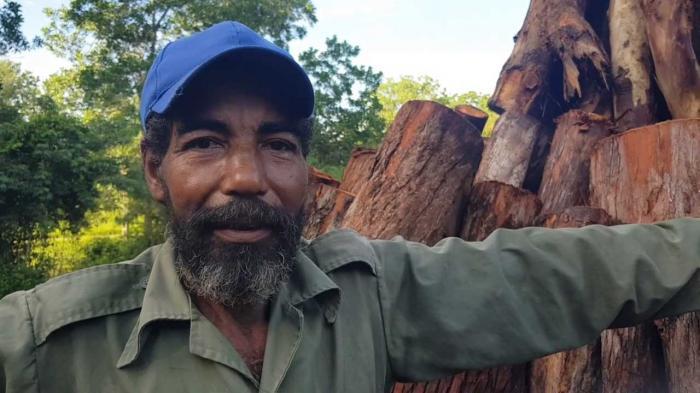
Pinar del Río receives him with pride. A few days ago, the national press announced that Pablo Pimienta Castro, forestry worker and charcoal burner of the Macurijes Agroforestry Company, received together with ten other Cubans the honorary title of Hero of Labor.
The news had been long awaited in these lands. At the age of 60, this tireless man who has devoted his life to an extremely hard and lonely job has managed to earn the respect and admiration of those around him, based on hatchet jobs and sleepless nights.
In an interview three years ago, when he already treasured all kinds of medals and awards, Pablo confessed to the journalist: "I hope to have on my chest one day that little golden star that the Heroes of Labor wear in Cuba". Today that dream has come true.
This decoration is the reward to more than 35 years of work in the mountains of the municipality of Mantua, this dark-haired Pinar del Río native, with a bushy mustache and eyes full of kindness, was not born there.
He says that he spent his childhood in La Güira, in the area of Luis Lazo, and in 1986, after serving an internationalist mission in Angola, from where he returned with the First Class Internationalist Combatant Medal, he decided to go to Mantua to visit some cousins, and never returned. The love of a woman and his job as a charcoal burner sealed his destiny in this land in the far west of Cuba.
"I started in the coal industry with my cousins. I kept telling myself that it was temporary, but it's been a few years and I'm still here. I have made ovens in all the mountains of the municipality," he says.
Pablo Pimienta is the star of simple legends, the kind that make up the exemplary life of a worker. Some of these legends include that he never goes on vacation; if there is no tractor, he goes by bicycle, and that his charcoal is the most appreciated in the kitchens of Mantua and beyond.
"Those are made-up stories, I go on vacation but not that much," says Pablo. "A furnace cannot be left for a party or for the beach, because the effort of many people is burned in one night. You have to watch over it to produce good coal, and I don't trust that to many people.
"How many furnaces have I made? Nobody knows. A thousand, 2,000. I can show you the marks of all the furnaces from the Comandancia, there in the hills, to Blanquizales, on the old airstrip.
"Now I work in the export coal business, which is a very big responsibility because it helps bring money to the country."
Although his profession is a solitary one, which forces him to spend a good part of his time away from his family, Pablo assures that "loneliness is made by oneself. I never feel alone, I have the forest, the wood, other furnaces to build, and the attention to the one that is burning, which doesn't let me blink an eye."
He says his family is his great treasure. "I got married, had two children who are hard workers and four grandchildren who are my life. When I arrive, they jump up and hug me, and that is the greatest gift for the days I spend away.
" I have no wealth, but I have a family that loves me. And what I will leave them someday will be my example, which is to work and work and work. I know that my grandchildren, whether they are doctors, teachers or charcoal burners, are going to be good."
To that beautiful example that for decades he has forged based on humility and dedication, the status of Hero of Labor of the Republic of Cuba is added now as a finishing touch to an extraordinary career.
“Making a furnace is not easy," Pablo continues, "and not only because it is a very hard work, but also because the wood must be well placed, so that it burns evenly, and if it does not breathe, and you do not know when and where to regulate the air intake, it blows and you only collect ashes, or worse, an accident can happen.
This was precisely the subject of his brief conversation with the President of the Republic Miguel Díaz-Canel Bermúdez during the award ceremony.
However, overwhelmed by the solemnity of the occasion, before the highest leadership of the country and before the other outstanding workers who were also recognized, Pablo confesses that at that moment he did not provide as many details about his work.
"The President asked me quietly and respectfuly, if it was difficult to make coal. And I told him it wasn't easy, but it wasn't difficult either."
(Translated by ESTI)















